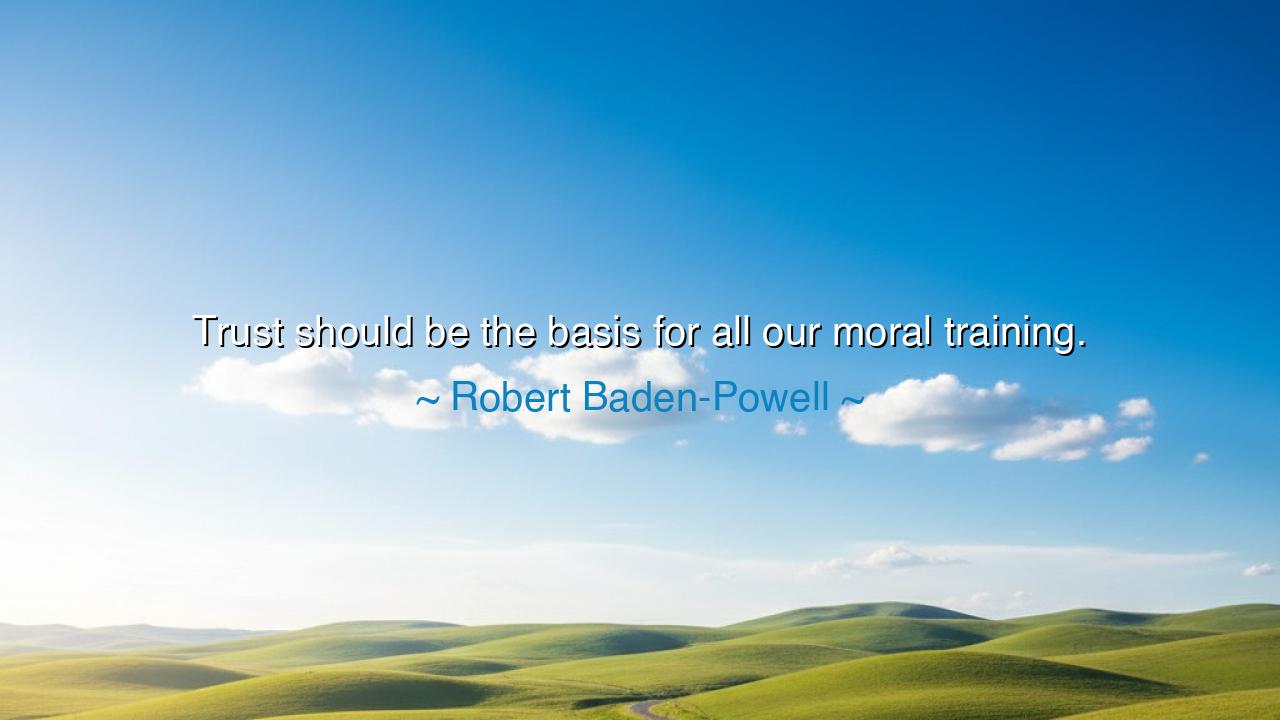
Trust should be the basis for all our moral training.






Robert Baden-Powell, the founder of the Scouting movement and a teacher of youth, spoke with the clarity of one who knew the shaping of character: “Trust should be the basis for all our moral training.” In this short command lies a truth as enduring as the mountains: that without trust, all virtues crumble, for honesty, loyalty, and justice themselves are born from the soil of trust. To train the soul in morals without first establishing trust is to build a temple upon shifting sand, destined to collapse in the first storm.
The ancients, too, knew this principle. In the schools of Athens, young men were taught not only philosophy but the art of living with honor, and at the heart of this was the cultivation of trustworthiness. A man who could not be trusted was considered unfit to lead, unfit to marry, unfit to serve his city. For trust was the bond that held the polis together, stronger than stone walls and sharper than bronze spears. Thus, when Baden-Powell placed trust at the foundation of moral training, he was not creating a new law, but recalling an ancient one.
History gives us examples luminous and dark. Consider the leadership of Abraham Lincoln, who in the darkest days of the American Civil War held his nation together not by fear but by the trust he inspired. His honesty was so renowned that he was called “Honest Abe,” and because people trusted his word, they followed him even when the road was filled with suffering. His moral vision did not rest upon commands or threats, but upon the trust that he and his people shared.
Yet the shadow of betrayal warns us of the opposite. Think of the fate of the French Revolution. At its beginning, lofty ideals of liberty, equality, and fraternity stirred the hearts of men. But when trust was broken — when leaders turned upon each other, when suspicion devoured loyalty — the Revolution descended into terror. Morality without trust became a mask for vengeance, and the guillotine sang its dreadful song in the squares of Paris. From this we see: without trust, even noble ideals rot into cruelty.
Children of tomorrow, understand this: all moral lessons, whether spoken by parent, teacher, or elder, are empty if trust is absent. To say “do not lie” has little power unless the one who speaks has proven himself truthful. To say “be loyal” carries no weight unless loyalty is shown in return. True moral training is not the carving of rules upon stone, but the weaving of trust between hearts, until character itself is bound by invisible cords of faith and honor.
The lesson is plain: if you wish to train others in goodness, first be trustworthy yourself. Do not command what you do not live. Show honesty in your dealings, consistency in your promises, and fairness in your judgments. In this way, those who look to you will not only hear your words, but believe them, for trust has made them living truth. And if you wish to learn, give your trust wisely to those whose lives embody the virtues you seek, and let their example shape you.
Practical action flows from this wisdom. Begin by keeping your word in the smallest matters, for trust is built not in grand gestures but in daily faithfulness. When teaching or guiding others, earn their trust before demanding their obedience. And when betrayed, do not let bitterness rule, but seek carefully to rebuild trust where it is possible, for in its restoration lies the healing of all wounds.
So let it be remembered: “Trust should be the basis for all our moral training.” Without trust, morality is a hollow shell; with trust, morality becomes a living flame. Trust makes teachings real, binds communities together, and gives strength to the soul. Guard it, build it, and honor it, for upon it rests the very foundation of a just and noble life.






AAdministratorAdministrator
Welcome, honored guests. Please leave a comment, we will respond soon